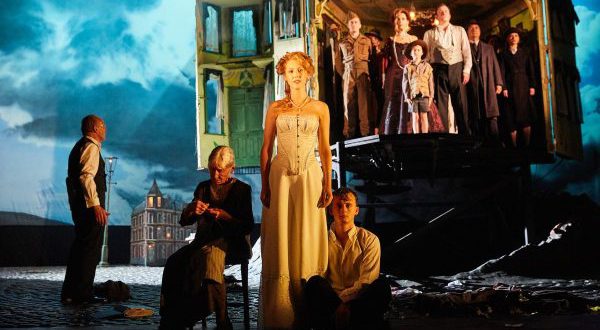You have no items in your cart. Want to get some nice things?
Go shopping

Written in 1944 and set in 1912, and mired in the social concerns of both those eras, it is difficult to see how J.B. Priestley’s An Inspector Calls can have relevance today. This is particularly so in the light of the problems of the text itself, which – despite being a GCSE set text and a staple of regional repertory theatre – is moralistic, over-emphatic, convoluted, too long and lacking in convincing characterisation. Nonetheless, Stephen Daldry’s revived production – which was first performed at the National Theatre in 1992 – is engaging and has a high production value that almost disguising these problems. Ultimately, however, it has a few deficiencies of its own.
Put briefly, An Inspector Calls is a socially conscious detective story, in which the enigmatic Inspector Goole visits the wealthy Birling family to uncover how they contributed to a young girl’s desperation that led her to commit suicide: the patriarch sacks her from his factory, his daughter has her fired from her local department store because she is jealous of her prettiness, his wife cruelly refuses to help her for no good reason at all, and so on. Daldry never lets us forget that what we are watching is a play, challenging any willing suspension of disbelief: it opens with a street urchin attempting to lift up the stage curtain, blurring the line between audience and actors; Inspector Goole strolls in from the stalls; the house lights come up at the apogee of Inspector Goole’s uncovering of the Birlings’ selfishness, uncomfortably bathing the audience in fluorescent light. This use of Brechtian technique – the verfremdungseffekt, otherwise known as the distancing effect that is designed to prevent the audience from a passive acceptance and enjoyment of the play as mere entertainment – is effective in underscoring the play’s social consciousness and enlivens what could otherwise be a torturous couple of hours wading through a deficient text. Whether the verfremdungseffekt is successful in what it sets out to achieve is debatable, but sadly not within the scope of this review.
Visually, An Inspectors Calls is stunning. The set has an almost filmic quality – unsurprising given Daldry’s extensive experience as a heavyweight Hollywood director, including Netflix’s latest series The Crown. The mood of a depressed industrial town is cleverly evoked through rain, smoke and masterful lighting design. The Birlings’ house resembles a doll’s house – too little for the actors to properly fit in – that is perched over an apocalyptic urban landscape, highlighting both the privileged status of the Birlings and the fragility of their position under Inspector Goole’s intense scrutiny. This house comes crashing down after the inspector forces the Birlings out of their self-satisfied bubble. It is a heavily symbolic moment – both shocking and almost patronising – and one indicative of Daldry’s lack of faith in the text itself.
The acting is mixed bag. Liam Brennan, who plays Inspector Goole, lacks any subtlety or mystery; the text is didactic enough without needing, for example, the line “We don’t live alone. We are members of one body. We are responsible for each other” being shouted in a spitting fury. A more convincing performance would leave the lines to speak for themselves. Carmela Corbett, who plays Sheila, also leaves much to be desired. Her movement and delivery is over-emphatic – wringing her hands in despair, rolling her eyes in dismissal – that makes Sheila’s transformation from superficial and spoiled to socially engaged and repentant somewhat unconvincing. Hamish Riddle gives a convincing performance as Eric Birling, the thoughtless dipsomaniac younger son. And Barbara Marten, who plays Sybil Birling is – simply – outstanding. Marten has a masterful handling of timing and variation that leaves her the star of the proceedings, contributing to a show that is – in the end – worth watching.
An Inspector Calls continues at the Playhouse Theatre until February 4th 2017. Tickets are available from £20.

About Emily Bueno
Emily Bueno has an M.Phil in literature from Trinity College, Dublin. She has written for the Telegraph Culture section and the TLS. She is a trainee solicitor and lives in London.




